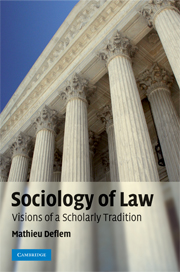Book contents
- Frontmatter
- Contents
- Preface and acknowledgements
- Introduction: sociology, society, law
- Part I Theoretical foundations of the sociology of law
- Part II Development and variations of the sociology of law
- Part III Sociological dimensions of law
- Part IV Special problems of law
- Conclusion: Visions of the sociology of law
- Bibliography
- Index
Introduction: sociology, society, law
Published online by Cambridge University Press: 05 June 2012
- Frontmatter
- Contents
- Preface and acknowledgements
- Introduction: sociology, society, law
- Part I Theoretical foundations of the sociology of law
- Part II Development and variations of the sociology of law
- Part III Sociological dimensions of law
- Part IV Special problems of law
- Conclusion: Visions of the sociology of law
- Bibliography
- Index
Summary
When we speak of “law,” “legal order,” or “legal proposition,” (Rechtssatz), close attention must be paid to the distinction between the legal and the sociological points of view.
– Max Weber (1922c: 1)By speaking of law and society we may forget that law is itself a part of society.
– Lon L. Fuller (1968: 57)Recovering the sociology of law
The development of the sociology of law cannot be told simply as it evolved since the sociological classics, for there is, in the case of this sociological specialty, no such history directly emanating from the discipline's earliest foundations. Although the classical scholars of sociology dealt with law elaborately on the basis of their respective theoretical perspectives, their works did not provide the initial onset for the sociology of law as we know it today. And even though there were scholars – especially in Europe – who sought to develop a distinctly sociological approach to law in the earlier half of the twentieth century, the so-called “sociological movement” in law that emerged in the years after World War II – especially in the United States – was primarily a product of the legal profession by way of some of the less practically inclined members in legal scholarship. These scholars sought to found a tradition of sociological jurisprudence and other perspectives of legal scholarship informed by social science in order to articulate an interest in the effects of law on society and, conversely, the influences of social events on substantive and procedural aspects of law.
- Type
- Chapter
- Information
- Sociology of LawVisions of a Scholarly Tradition, pp. 1 - 14Publisher: Cambridge University PressPrint publication year: 2008



